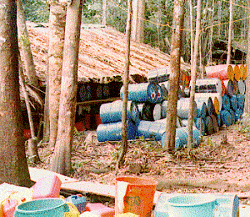
United Nations Convention Against Illicit Traffic in Narcotic Drugs and Psychotropic Substances
Encyclopedia
The United Nations Convention Against Illicit Traffic in Narcotic Drugs and Psychotropic Substances of 1988 is one of three major drug control treaties currently in force. It provides additional legal mechanisms for enforcing the 1961 Single Convention on Narcotic Drugs
and the 1971 Convention on Psychotropic Substances
. The Convention entered into force on November 11, 1990. As of January 1, 2005, there were 170 Parties to the Convention http://www.unodc.org/unodc/en/treaty_adherence.html.
. The Preamble notes that previous enforcement efforts have not stopped drug use, warning of "steadily increasing inroads into various social groups made by illicit traffic in narcotic drugs and psychotropic substances." It cautions that the drug trade and related activities "undermine the legitimate economies and threaten the stability, security and sovereignty of States." The sense of urgency is underscored by the image of innocent boys and girls being exploited:
 Much of the treaty is devoted to fighting organized crime
Much of the treaty is devoted to fighting organized crime
by mandating cooperation in tracing and seizing drug-related assets. Article 5 of the Convention requires its parties to confiscate proceeds from drug offenses. It also requires parties to empower its courts or other competent authorities to order that bank, financial, or commercial records be made available or seized. The Convention further states that a party may not decline to act on this provision on the ground of bank secrecy
.
Single Convention on Narcotic Drugs
The Single Convention on Narcotic Drugs of 1961 is an international treaty to prohibit production and supply of specific drugs and of drugs with similar effects except under licence for specific purposes, such as medical treatment and research...
and the 1971 Convention on Psychotropic Substances
Convention on Psychotropic Substances
The Convention on Psychotropic Substances of 1971 is a United Nations treaty designed to control psychoactive drugs such as amphetamines, barbiturates, benzodiazepines, and psychedelics signed at Vienna on February 21, 1971...
. The Convention entered into force on November 11, 1990. As of January 1, 2005, there were 170 Parties to the Convention http://www.unodc.org/unodc/en/treaty_adherence.html.
Background
The Convention represents an escalation in the War on DrugsWar on Drugs
The War on Drugs is a campaign of prohibition and foreign military aid and military intervention being undertaken by the United States government, with the assistance of participating countries, intended to both define and reduce the illegal drug trade...
. The Preamble notes that previous enforcement efforts have not stopped drug use, warning of "steadily increasing inroads into various social groups made by illicit traffic in narcotic drugs and psychotropic substances." It cautions that the drug trade and related activities "undermine the legitimate economies and threaten the stability, security and sovereignty of States." The sense of urgency is underscored by the image of innocent boys and girls being exploited:
- [C]hildren are used in many parts of the world as an illicit drug consumers market and for purposes of illicit production, distribution and trade in narcotic drugs and psychotropic substances, which entails a danger of incalculable gravity.
Drug manufacture and distribution

Organized crime
Organized crime or criminal organizations are transnational, national, or local groupings of highly centralized enterprises run by criminals for the purpose of engaging in illegal activity, most commonly for monetary profit. Some criminal organizations, such as terrorist organizations, are...
by mandating cooperation in tracing and seizing drug-related assets. Article 5 of the Convention requires its parties to confiscate proceeds from drug offenses. It also requires parties to empower its courts or other competent authorities to order that bank, financial, or commercial records be made available or seized. The Convention further states that a party may not decline to act on this provision on the ground of bank secrecy
Bank secrecy
Bank secrecy is a legal principle in some jurisdictions under which banks are not allowed to provide to authorities personal and account information about their customers unless certain conditions apply...
.

